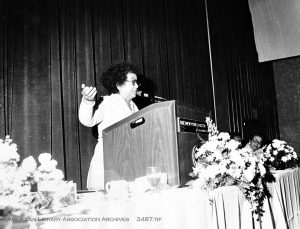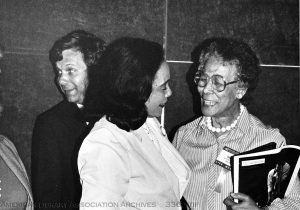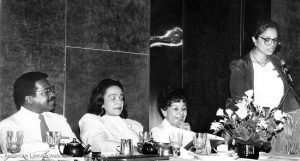
2019 marks the 50 year anniversary of the founding of the Coretta Scott King Book Awards. This book award commemorates the life and work of Dr. Martin Luther King, Jr., and honors his wife, Mrs. Coretta Scott King, for her courage and determination to continue the work for peace and world brotherhood. The award is given out every year to outstanding African American authors and illustrators of books for children and young adults that demonstrate an appreciation of African American culture and universal human values.(1)
It was founded by librarians Glyndon Flynt Greer and Mable McKissick, and publisher John Carroll during the 1969 American Library Association Annual Conference in Atlantic City. According to McKissick, “We [her and Greer] met at the booth of John Carroll. Since it was the day before the Newbery/Caldecott awards, the discussion turned to Black authors …”(2) and their lack of representation. It is reported that Carroll overhead the conversation and asked, “Then why don’t you ladies establish your own award?”(3)
According to Greer’s sister, Greer, McKissick, Carroll, and Harriett Brown spent that evening discussing the fact that there was no award for African-American authors and illustrators. Together, they established the Coretta Scott King Award. While it remained unknown, Greer worked on gaining support from publishing companies, writers, and private companies, including Coca Cola, Johnson Publishing, and Encyclopedia Britannica.(4)
The following year, the award was presented at the New Jersey Library Association’s annual banquet on May 9, 1970. Lillie Patterson was the first recipient and was recognized for her book, Dr. Martin Luther King, Jr., Man of Peace.(5) The award was presented one more time at the New Jersey Library Association meeting before it was presented at a breakfast at the 1972 ALA Annual Conference.

Under the leadership of Greer, the award task force continued to operate on its own, until 1979 when the Coretta Scott King Award Task Force found a home with the Social Responsibilities Round Table. In regard to this occasion, Greer’s sister wrote, “[Greer’s] dream was fulfilled in 1979 in Dallas, Texas … With this accomplishment, she could rest easy, knowing that the Award had finally reached a level of notoriety and became a permanent part of the American Library Conference schedule agenda.”(6)
However, the award was not officially recognized by ALA until the 1982 Annual Conference. At the Council meeting, Awards Committee chair, Janice Feye-Stukas, “pointed out the award … has been in existence for 12 years,” and recommended its approval as an ALA award.(7) Council approved the award, and the Executive Board, on the motion of EJ Josey, Jane Anne Hannigan, Herbert Biblo, and Ella Yates-Edwards, also gave its approval.(8)
The award remained with SRRT until it changed affiliations to the Ethnic and Multicultural Information Exchange Round Table. Fran Ware, the CSK committee chair, noted that “joining EMIERT was initiated because their activities closely mirror those of the Coretta Scott King Task Force.”(9)
Since its conception fifty years ago in 1969, the award has expanded. In 1974, the committee honored George Ford as the first illustrator to receive the award for his work on Ray Charles. Further additions include the John Steptoe Award for New Talent established in 1995, and the Coretta Scott King – Virginia Hamilton Award for Lifetime Achievement established in 2010.
The Coretta Scott King Book Awards brought an award to ALA that celebrates and recognizes black authors and illustrators in children and youth literature. But perhaps just as importantly, it stands as an example of librarians taking action and coming out with tangible results. From a conversation between two librarians and a publisher over the lack of an award for black authors, came a prestigious award celebrating its 50th year.
This year, the Coretta Scott King Book Awards Committee is celebrating its 50 year anniversary. Keep track of their activities on their website: http://www.ala.org/rt/emiert/cskbookawards/csk50. And help preserve the memories of the award and its committee! If you are a former or current member of the committee with files and photographs of its activities, consider contacting the American Library Association Archives to preserve this important piece of ALA history.

- Coretta Scott King Book Awards Committee, “The History of the Coretta Scott King Book Awards,” Ethnic & Multicultural Information Exchange Round Table, http://www.ala.org/rt/emiert/cskbookawards/about.
- “Mable R. McKissick – A Profile,” July 13, 1982, Record Series 10/2/6, Box 4, Folder: SRRT-Coretta Scott King Award, 1973-86, American Library Association Archives.
- Carolyn L. Garnes, “The Power of an Idea: A Salute to Coretta Scott King Book Award Founders,” Ethnic & Multicultural Information Exchange Round Table, http://www.ala.org/rt/emiert/cskbookawards/csk50/Founders
- “How I Remember Glyndon,” Susie Flynt Shurney, Record Series 10/2/6, Box 4, Folder: SRRT-Coretta Scott King Award, 1973-86, ALA Archives.
- American Libraries, Vol. 1, No. 2 (May 1970), pg. 21.
- “How I Remember Glyndon,” Susie Flynt Shurney, Record Series 10/2/6, Box 4, Folder: SRRT-Coretta Scott King Award, 1973-86, ALA Archives.
- Council Meeting Minutes, July 11-14, 1982, pg. 127, Record Series 1/1/1, Box 37, Folder: Minutes, Annual Conference, 1982, ALA Archives.
- Executive Board Meeting Minutes, July 11-13, 1982, pg. 157, Record Series 2/1/1, Box 22, Folder: July 11-13, 1982, ALA Archives.
- SRRT Newsletter, Issue 146/147 (June 2004), pg. 7.